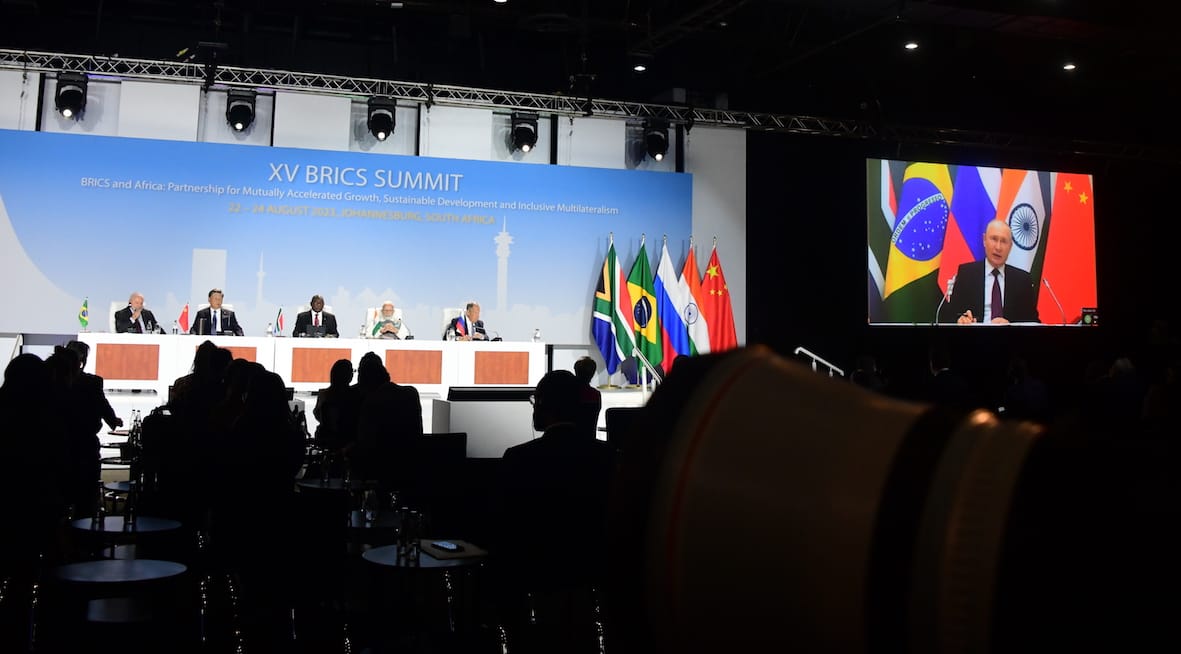Anwar Ibrahim, Malaysia’s prime minister, is known to be bold.
Anwar’s decision to join BRICS, with Malaysia this week formally submitting its application, is in keeping with his determination to pursue a “fiercely independent” foreign policy.
True, he chose to announce the intention to join the grouping of Brazil, Russia, India, China and South Africa when China’s Li Qiang visited Malaysia in June, but it was not a surprising declaration. Anwar has long been advocating issues that lie at the core of BRICS’s thinking. If the move was supposed to signal an interest in forging stronger relations with China, there are other ways in which Anwar could have acted.
The comments that Anwar made about BRICS instead came as a logical succession to issues he had raised previously – the ambition to set up an Asian Monetary Fund and the question of de-dollarisation. These are issues on his mind, and he has been talking about them to Beijing and many others.
Anwar is sensitive to the economic injustice that developing countries have suffered at the hands of the larger developed economies.
The move also presages Malaysia’s role in ASEAN as a nation that can take the lead in championing the BRICS agenda. This is particularly significant since Malaysia will assume the role as ASEAN chair in 2025.
Malaysia has often acted as a pathbreaker regionally. The first prime minister Tunku Abdul Rahman was pivotal in establishing the Non-Aligned Movement. Mahathir Mohamad, who had two stints as prime minister, was seen as a champion of the Global South and a firm supporter of Japanese industry and led debates about “Asian values”.
Anwar is bucking the favoured regional orthodoxy. He sees no trouble in rejecting binary choices – between either the United States or China – and instead engaging in new links. He asserts: “We can no longer accept the scenario where the West wants to control the discourse because the fact is they are not colonial powers anymore and independent countries should be free to express themselves.”

The decision to join BRICS seems a choice for the future. A PWC forecast expects China to be the world’s largest economy in 2050, with India overtaking the United States to take the second spot. Indonesia, Brazil and Russia will rise to occupy the fourth, fifth and sixth places.
In the decades to come, the structure of power will shift. If in 2016, China and India accounted for 25 per cent of the global share of GDP, in 2050 they will contribute 35 per cent. Both the United States and European Union will experience declines in their share going forward.
Viewed from another perspective, the contraction is clear. In 1995, the seven biggest emerging economies, or “E7” (China, India, Indonesia, Brazil, Russia, Mexico and Turkey), were half as big as the G7 (United States, United Kingdom, Canada, Japan, Germany, France and Italy). The tables will be turned in 2050: the E7 could then be twice the size of the G7.
Anwar has got his numbers and trends right, and he is taking a pragmatic look at how things will turn out. He is not content with a quiet understanding of how things will unfold. He likely seeks to provide the leadership that will tilt for the future.
While Malaysia sees inclusion in the BRICS grouping as an expression of its non-alignment, Indonesia wishes to convey the same message by staying out.
Thailand for its part will seek to join both BRICS and the Organisation for Economic Cooperation and Development. But other Southeast Asian members are less enthused with BRICS. Singapore and the Philippines have been reserved on how they stand, and likely will not join the grouping. And while some members within BRICS, particularly China and India, might be keen to have Indonesia in its midst, Indonesia’s reluctance is apparent. Instead, Indonesia has joined the OECD.
Indonesia’s decision was not without its own dilemma. Foreign minister Retno Marsudi told a meeting of BRICS’ counterparts in June 2023 that the group should advocate the right to development of each country. Retno pointed to the economic injustice to which developing countries had been subjected, expressing hope for support from BRICS. She also stressed the importance of multilateralism and the need to abide by international law without practising double standards.
While Malaysia sees inclusion in the BRICS grouping as an expression of its non-alignment, Indonesia wishes to convey the same message by staying out.
Anwar is sensitive to the economic injustice that developing countries have suffered at the hands of the larger developed economies. This is a rallying issue that BRICS holds up. He shares the same ideological concerns as does BRICS. He probably hopes to convince ASEAN member states that they would benefit by being in the organisation. He has, for example, made clear his view that the use of local currencies is an idea that holds well with China and other ASEAN member states.
Next year, when Malaysia is chair, Anwar has a splendid opportunity to raise the issue of BRICS among his ASEAN comrades.
And if he does not explicitly mention BRICS, he will doubtless flag concerns about participation in global supply chains, trade discrimination, the outdated global financial system, the inordinate power in the hands of the developed world, and the need to support multilateralism and with a more balanced world order.
These, after all, are concerns that BRICS tries to grapple with.

